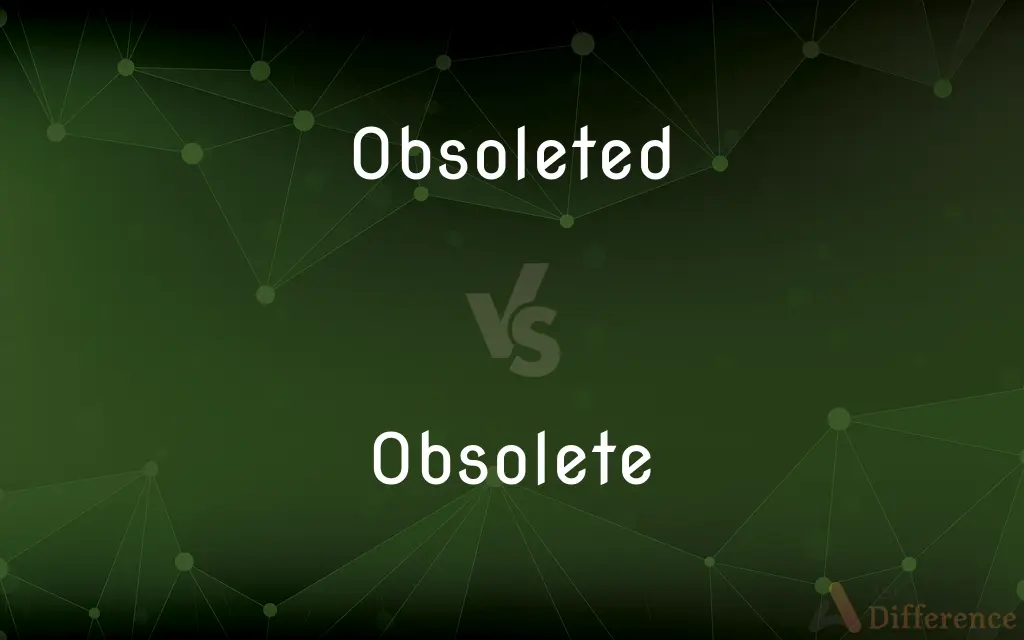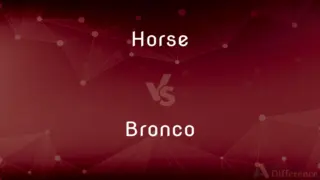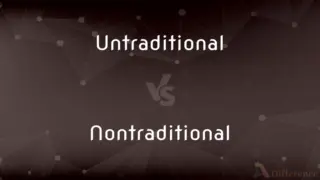Obsoleted vs. Obsolete — What's the Difference?
By Maham Liaqat & Urooj Arif — Updated on March 7, 2024
Obsoleted refers to the process of becoming out-of-date, while obsolete describes something already out-of-date.

Difference Between Obsoleted and Obsolete
Table of Contents
ADVERTISEMENT
Key Differences
Obsoleted is a verb form that implies an action or process, indicating that something is being made obsolete or out-of-date. Obsolete, on the other hand, is an adjective that describes items, technologies, or practices that have already become outdated and no longer used.
The use of "obsoleted" often involves a specific agent or cause that leads to something becoming obsolete. For example, the introduction of digital cameras obsoleted many film-based photography techniques. This highlights the dynamic process of change and advancement. In contrast, describing something as "obsolete" does not necessarily imply how or why it became so; it simply states that it is no longer in use. For instance, saying floppy disks are obsolete focuses on their current state, without detailing the progression that led to their redundancy.
The distinction between these terms is also reflective of their grammatical roles. "Obsoleted" serves as a verb, indicating action, while "obsolete" functions as an adjective, describing a particular quality or condition.
Comparison Chart
Part of Speech
Verb (past tense or participle)
Adjective
Indicates
Process of becoming outdated
State of being outdated
ADVERTISEMENT
Usage Example
"Smartphones obsoleted many traditional gadgets."
"VHS tapes are considered obsolete."
Focus
The action or cause of becoming irrelevant
The condition of irrelevance or disuse
Context
Often requires specifying what has caused the obsolescence
Describes an inherent quality, without needing to specify a cause
Compare with Definitions
Obsoleted
Made outdated or replaced by something newer.
Streaming services have largely obsoleted DVD rentals.
Obsolete
No longer in use; outdated.
Typewriters are now considered obsolete.
Obsoleted
Caused to fall into disuse.
The invention of the light bulb obsoleted candle-based lighting.
Obsolete
Falling out of favor or functionality.
With smartphones, standalone GPS devices are becoming obsolete.
Obsoleted
Rendered unnecessary.
Advances in medical treatment have obsoleted some older drugs.
Obsolete
Surpassed by new technology or trends.
Floppy disks became obsolete with the advent of USB storage.
Obsoleted
Pushed out of use or relevance by new technology.
Email has obsoleted traditional mail for many applications.
Obsolete
No longer relevant or needed.
The manual typewriter is an obsolete tool in modern offices.
Obsoleted
Discontinued because of replacement.
Digital downloads have obsoleted physical music formats for many consumers.
Obsolete
No longer produced or used; out of date.
Many parts for older cars are obsolete and hard to find.
Obsoleted
No longer in use
An obsolete word.
Obsolete
No longer in use
An obsolete word.
Obsoleted
Outmoded in design, style, or construction
An obsolete locomotive.
Obsolete
Outmoded in design, style, or construction
An obsolete locomotive.
Obsoleted
(Biology) Vestigial or rudimentary, especially in comparison with related or ancestral species, as the tailbone of an ape. Used of an organ or other part of an organism.
Obsolete
(Biology) Vestigial or rudimentary, especially in comparison with related or ancestral species, as the tailbone of an ape. Used of an organ or other part of an organism.
Obsoleted
To cause to become obsolete
"The textbook publishers use every trick known to the marketing mind to obsolete their products year after year, thus closing off the possibility of second-hand sales" (Thomas Frank).
Obsolete
To cause to become obsolete
"The textbook publishers use every trick known to the marketing mind to obsolete their products year after year, thus closing off the possibility of second-hand sales" (Thomas Frank).
Obsoleted
Simple past tense and past participle of obsolete
Obsolete
(of words, equipment, etc.) No longer in use; gone into disuse; disused or neglected (often in favour of something newer).
It is speculated that, within a few years, the Internet's speedy delivery of news worldwide will make newspapers obsolete.
Obsolete
(biology) Imperfectly developed; not very distinct.
Obsolete
To cause to become obsolete.
This software component has been obsoleted.
We are in the process of obsoleting this product.
Obsolete
No longer in use; gone into disuse; disused; neglected; as, an obsolete word; an obsolete statute; - applied chiefly to words, writings, or observances.
Obsolete
Not very distinct; obscure; rudimental; imperfectly developed; abortive.
Obsolete
To become obsolete; to go out of use.
Obsolete
Old; no longer in use or valid or fashionable;
Obsolete words
An obsolete locomotive
Outdated equipment
Superannuated laws
Out-of-date ideas
Obsolete
No longer in use;
Obsolete words
Common Curiosities
How do I know if something is obsolete?
It's typically considered obsolete if it's no longer used or has been replaced by a more efficient alternative.
What does it mean when something is obsoleted?
It means something is being made outdated or replaced by newer technology or methods.
Is "obsoleted" commonly used in English?
It's less common than "obsolete" but still correct, particularly in contexts discussing the process of becoming outdated.
Is obsolescence always a negative outcome?
Not necessarily; obsolescence can lead to innovation and improvement, pushing society towards better technologies.
Can obsolete items still have value?
Yes, obsolete items can have sentimental, historical, or collectible value even if they're no longer practical for their original purpose.
Can a skill become obsolete?
Yes, as technology advances, certain skills can become less in demand or replaced by the need for new skills.
Is it possible to prevent a technology from becoming obsolete?
While obsolescence can't always be prevented, continuous improvement and updates can extend the relevance of a technology.
Does obsolescence affect digital products?
Yes, digital products can become obsolete as new software, platforms, and technologies emerge.
Can a technology become obsolete overnight?
Yes, rapid advancements can render a technology obsolete very quickly, though it's more often a gradual process.
Can a product be designed to become obsolete?
Yes, this is known as planned obsolescence, where a product is designed with a limited useful life to encourage consumers to purchase newer models.
What is the difference between "obsolete" and "antiquated"?
"Obsolete" refers to something no longer in use, typically replaced by something better. "Antiquated" suggests something is old-fashioned but not necessarily replaced by a better alternative.
Do all industries experience obsolescence at the same rate?
No, the rate of obsolescence varies greatly among industries due to differences in innovation, regulation, and consumer demand.
How does obsolescence impact the environment?
It can lead to increased waste and environmental stress as obsolete products are discarded, highlighting the importance of recycling and sustainable design.
What role does consumer behavior play in obsolescence?
Consumer demand for newer, better products can accelerate the obsolescence of existing products.
How can businesses manage obsolescence?
Businesses can manage obsolescence through strategic planning, research and development, and by staying adaptable to industry changes.
Share Your Discovery

Previous Comparison
Horse vs. Bronco
Next Comparison
Untraditional vs. NontraditionalAuthor Spotlight
Written by
Maham LiaqatCo-written by
Urooj ArifUrooj is a skilled content writer at Ask Difference, known for her exceptional ability to simplify complex topics into engaging and informative content. With a passion for research and a flair for clear, concise writing, she consistently delivers articles that resonate with our diverse audience.















































